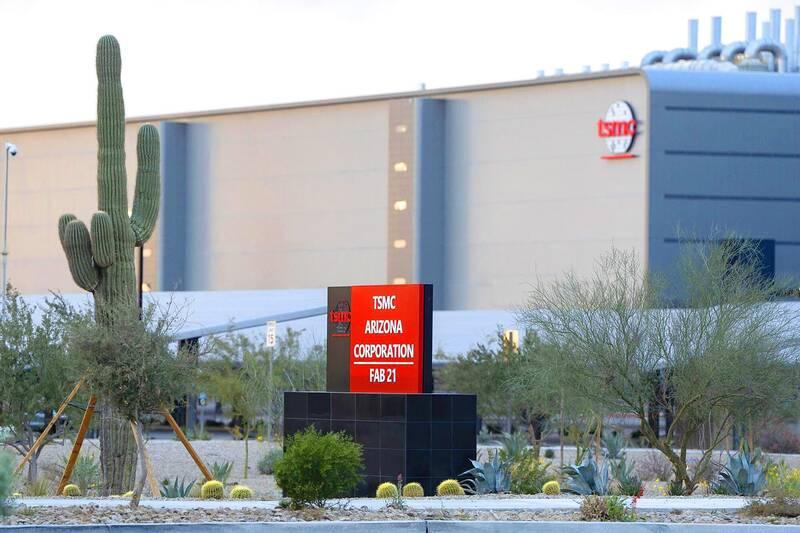Rick Cassidy, the chairman of Taiwan Semiconductor Manufacturing Co's (TSMC, 台積電) US subsidiary, TSMC Arizona Corp, plans to retire, but the company has yet to name a successor.
After Cassidy made his intention to retire known, TSMC Arizona held a special general meeting and approved a resolution that Cassidy would not continue as chairman and would not remain as a director, TSMC said in a statement filed with the Taiwan Stock Exchange last night.
The meeting also approved a plan to appoint TSMC Arizona president Rose Castanares as a director, the company said, adding that Cassidy has been named as an advisor to TSMC Arizona.

Photo: Bloomberg
Cassidy joined TSMC's subsidiary in North America in 1997 as a vice president for customer management and was promoted to be the subsidiary's president and chief executive officer in 2005, the world's largest contract chipmaker said.
Cassidy was named TSMC's vice president in 2008, supervising the chipmaker's business in the North American market, and then took the title of TSMC senior vice president, TSMC said.
He served as TSMC Arizona president from December 2020 to April 2023, before becoming chairman of the board in April 2023, it said.
During his 27 years at TSMC, Cassidy was dedicated to providing the best service to the company's clients and won their trust, and he made a significant contribution to the fabless IC design model and to the company's growth, TSMC said.
TSMC held a board meeting in Arizona in mid-February, marking the first time that the company held such a meeting in the US in its 37-year history.
The chipmaker is investing US$65 billion in Arizona to build three advanced wafer fabs. The first one began mass production last year, using the 4-nanometer process, and construction of the second is nearly completed, with the installation of equipment under way. TSMC broke ground on the third fab in late April.
In early March, TSMC pledged to invest an additional US$100 million over the next few years to build three more wafer fabs, two IC packaging plants and one research and development center in Arizona at around the time US President Donald Trump threatened to impose a tariff on semiconductors.
With the Trump administration continuing to threaten tariffs despite TSMC's US$100 billion olive branch, the company hit back in May, saying that any future tariffs on Taiwanese semiconductors could reduce demand for chips and derail its pledge to increase its investment in Arizona.

In Italy’s storied gold-making hubs, jewelers are reworking their designs to trim gold content as they race to blunt the effect of record prices and appeal to shoppers watching their budgets. Gold prices hit a record high on Thursday, surging near US$5,600 an ounce, more than double a year ago as geopolitical concerns and jitters over trade pushed investors toward the safe-haven asset. The rally is putting undue pressure on small artisans as they face mounting demands from customers, including international brands, to produce cheaper items, from signature pieces to wedding rings, according to interviews with four independent jewelers in Italy’s main

Japanese Prime Minister Sanae Takaichi has talked up the benefits of a weaker yen in a campaign speech, adopting a tone at odds with her finance ministry, which has refused to rule out any options to counter excessive foreign exchange volatility. Takaichi later softened her stance, saying she did not have a preference for the yen’s direction. “People say the weak yen is bad right now, but for export industries, it’s a major opportunity,” Takaichi said on Saturday at a rally for Liberal Democratic Party candidate Daishiro Yamagiwa in Kanagawa Prefecture ahead of a snap election on Sunday. “Whether it’s selling food or

CONCERNS: Tech companies investing in AI businesses that purchase their products have raised questions among investors that they are artificially propping up demand Nvidia Corp chief executive officer Jensen Huang (黃仁勳) on Saturday said that the company would be participating in OpenAI’s latest funding round, describing it as potentially “the largest investment we’ve ever made.” “We will invest a great deal of money,” Huang told reporters while visiting Taipei. “I believe in OpenAI. The work that they do is incredible. They’re one of the most consequential companies of our time.” Huang did not say exactly how much Nvidia might contribute, but described the investment as “huge.” “Let Sam announce how much he’s going to raise — it’s for him to decide,” Huang said, referring to OpenAI

The global server market is expected to grow 12.8 percent annually this year, with artificial intelligence (AI) servers projected to account for 16.5 percent, driven by continued investment in AI infrastructure by major cloud service providers (CSPs), market researcher TrendForce Corp (集邦科技) said yesterday. Global AI server shipments this year are expected to increase 28 percent year-on-year to more than 2.7 million units, driven by sustained demand from CSPs and government sovereign cloud projects, TrendForce analyst Frank Kung (龔明德) told the Taipei Times. Demand for GPU-based AI servers, including Nvidia Corp’s GB and Vera Rubin rack systems, is expected to remain high,